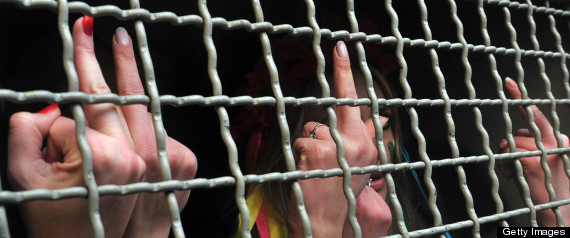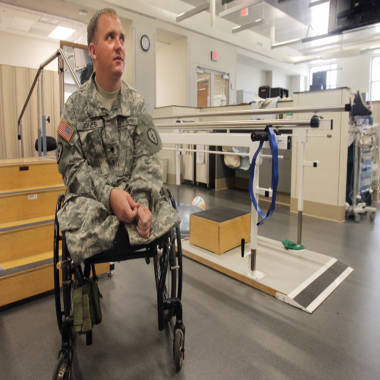OFF THE WIRE
BY: William J. Felchner
VIDEO,
http://youtu.be/CWNmCnyjUEASource:
factoidz.comUSA - The outlaw biker gang can trace its origins to the period after World War II where returning veterans and other roadies began to organize themselves in clubs, pining for the freedom, action and nonconformity that the motorcycle offered. One of the seminal events in outlaw biker history was "The Hollister Riot," which took place over the July Fourth 1947 holiday weekend in Hollister, California, where some 4,000 motorcycle enthusiasts invaded the small town. The ensuing ruckus was later sensationalized in the July 21, 1947, issue of Life magazine, marking a famous milestone in biker history.
The Hollister Gypsy Tour, as the event was billed, included the Boozefighters, a South Central Los Angeles motorcycle club founded in 1946 by World War II vet William "Wino Willie" Forkner (1921-1997). Forkner reveled in his reputation as a biker hellraiser, and reportedly served as the inspiration for Lee Marvin's Chino character in Columbia Pictures' The Wild One (1953), which also starred Marlon Brando as bad boy Johnny Strabler, leader of the fictional Black Rebels.
Here are ten notorious outlaw biker gangs that rule the road in biker history. These are the so-called "1%ers," the bikers who operate out of the mainstream as compared to the other 99% of motorcyclists who abide by the law and norms of society. Kick start your engines and show your colors…
Hells Angels (1948-present)
Unarguably the best-known outlaw biker gang in history, Hells Angels owes its name to World War II and possibly the 1930 Howard Hughes movie of the same name. During Big Two, there did exist the United States Army Air Forces 303rd Heavy Bombardment Group (H) of the U.S. 8th Air Force which billed itself as Hell's Angels, flying B-17 combat missions out of Molesworth, England, from 1942-45.
Hells Angels was formed in the Fontana/San Bernardino, California, area on March 17, 1948 as an offshoot of the Pissed Off Bastards of Bloomington, a California motorcycle club founded in 1945 by American veterans of the air war. Other independent chapters of Hells Angels later sprouted up in Oakland, Gardena and San Francisco.
Hells Angels eventually spread its wings, with the club now sporting charters in 29 countries, including Canada, Brazil, Australia, New Zealand, the United Kingdom, Portugal, Russia, Greece, Denmark, France, Turkey and the Dominican Republic.The Hells Angels insignia is the infamous "death's head," designed by Frank Sadilek, a former president of the San Francisco chapter.
Both American and Canadian law enforcement have labeled the Hells Angels Motorcycle Club (HAMC) a crime syndicate, asserting that its members routinely engage in drug trafficking, extortion and violence. Hells Angels garnered notoriety at the Altamont Free Concert on December 6, 1969, when they were hired by the Rolling Stones to act as stage security. Mayhem ensued at the drug/alcohol fueled event that boasted of a crowd of 300,000, with four people losing their lives.
Mongols (1969-present)
The Mongols was founded on December 5, 1969 in Montebello, California, by Hispanic veterans of the Vietnam War. Reportedly denied membership in Hells Angels because of their race, the Mongols eventually branched out, currently boasting of chapters in 14 states and four foreign countries.
Law enforcement has classified the Mongols as a criminal enterprise, engaging in loan sharking, drug trafficking, racketeering, theft and murder for hire. ATF agent William Queen, using the alias Billy St. John, successfully infiltrated the Mongols in 1998, resulting in 53 Mongol convictions.
The Mongols and their hated rivals Hells Angels engaged in an infamous brawl and gunfight at Harrah's Casino in Laughlin, Nevada, in 2002. When the smoke had cleared, one Mongol and two Hells Angels lay dead on the casino floor.
Pagans (1959-present)
Lou Dobkins, a biochemist at the National Institute of Health, founded the Pagans in Prince George's County, Maryland, in 1959. By the late 1960s, the Pagans were the dominant biker club on the East Coast, riding British Triumph motorcycles (later traded in for Harley Davidsons) and sporting their distinctive patch depicting the Norse fire god Sutr wielding a flaming sword.
The Pagans currently operate in eleven states, with Delaware County, Pennsylvania, serving as their Mother chapter. American law enforcement has classified the Pagans as a criminal enterprise, engaging in a host of illegal activities, including gun running, drug trafficking, arson, methamphetamine production and distribution, prostitution, racketeering and murder for hire.
In 2002, the Pagans and Hells Angels clashed at the Hellraiser Ball in Long Island, New York, where ten people were wounded and one Pagan was allegedly shot and killed by a Hells Angels member. Three years later, the Vice President of the Hells Angels Philadelphia chapter was killed by gunfire while driving his truck on the Schuylkill Expressway, with the Pagans allegedly carrying out the hit.
Outlaws (1935-present)
The Outlaws can trace their history back to 1935 when the McCook Outlaws Motorcycle Club was formed out of Matilda's Bar on old Route 66 in McCook, Illinois. In the ensuing years, the club morphed into the McCook Outlaws, the Chicago Outlaws and the American Outlaws Association (A.O.A.). Their first out of state chapter came in Florida in 1967. In 1977, the Canadian biker gang Satan's Choice joined the Outlaws franchise, making it the first chapter outside of the United States. Today, the Outlaws are active in some 14 states, with international chapters in the United Kingdom, Australia, France, Germany, Sweden, Thailand, Norway, Poland, the Philippines, et al.
The Outlaws sport a distinctive patch comprised of a skull and crossed pistons. Their official motto, adopted in 1969, is "God forgives, Outlaws don't."
Law enforcement has categorized the Outlaws as an organized crime syndicate, engaging in drug trafficking, murder, extortion and prostitution. The Outlaws have had their run-ins with police and other biker gangs. In 2007, Outlaws member Frank Rego Vital was shot and killed outside the Crazy Horse Saloon in Forest Park, Georgia, by two Renegades motorcycle club members who had reportedly acted in self-defense.
Bandidos (1966-present)
The Bandidos was founded by Marine Corps and Vietnam War veteran Don Chambers in San Leon, Texas, in 1966. The club's official motto is "We are the people our parents warned us about," with a big Mexican in sombrero brandishing a machete and pistol adorning the club's distinctive patch. The Bandidos currently boast of 104 chapters in the United States, along with international chapters in Germany, Australia, Denmark, France, Italy, Spain, Sweden, Norway, Malaysia, Indonesia, Thailand, Singapore, Costa Rica, Belgium and the Channel Islands.
Law enforcement has classified the Bandidos as an organized crime syndicate, engaging in murder, drug trafficking, money laundering, extortion, gun running and witness tampering. From 1994 to 1997 the so-called "Great Nordic Biker War" was waged in Scandinavia pitting Bandidos versus Hells Angels in a bloody turf war that resulted in eleven murders. Vagos (1965-present)
Originally called the Psychos, Vagos was formed in Temescal Valley, California, in 1965. The club's distinctive green/red patch pictures the Norse god Loki straddling a motorcycle. Vagos currently operates mainly in the southwestern United States and northern Mexico.
Both the FBI and the ATF consider Vagos an outlaw biker gang, engaging in drug trafficking, gun running, auto theft, money laundering and murder. In 2002, however, Vagos members turned in the estranged wife of a Pomona, California, police detective who had attempted to hire a Vagos hit man to murder her husband.
Law enforcement has successfully conducted several undercover investigations of Vagos and their illegal activities. In 2004, authorities arrested 26 Vagos members/associates and seized $125,000 in cash, drugs and weapons.
Pennsylvania Warlocks (1967-present)/Florida Warlocks (1967-present)
The Pennsylvania Warlocks was founded in Philadelphia in February 1967. The club's distinctive patch features the Harpy, the legendary winged beast from Greek mythology. The Pennsylvania Warlocks boast of chapters in New Jersey, Ohio, Illinois, Florida, Minnesota and Massachusetts. The Pennsylvania Warlocks have been linked to organized crime and methamphetamine production and distribution.
The Florida Warlocks was founded by U.S. Navy veteran Tom "Grub" Freeland in Orlando, Florida, in 1967. The club's logo is a blazing eagle while their official motto is "To find us you must be good. To catch us…you must be fast. To beat us…you must be kidding!" The Florida Warlocks have chapters in South Carolina, Virginia, West Virginia, New York, the United Kingdom and Germany. The Florida Warlocks were successfully infiltrated by the ATF in 1991 and again in 2003, with convictions for drug and weapon charges resulting from the latter.
Sons of Silence (1966-present)
The Sons of Silence was founded in Niwot, Colorado, in 1966. The club sports a distinctive patch featuring the American Eagle superimposed over a large "A" – highly reminiscent of the Anheuser-Busch logo. The gang's official motto is "Donec mors non separat" – Latin for "Until death separates us."
The Sons of Silence boast of chapters in Illinois, Wyoming, Arkansas, Florida, Indiana, Kansas, Minnesota, Kentucky, North Dakota, Mississippi and Germany. The Sons of Silence have been implicated in drug trafficking and weapons violations.
Highwaymen (1954-present)
The Highwaymen was established in Detroit, Michigan, in 1954. The club's distinctive patch features a winged skeleton sporting a leather jacket, motorcycle cap and the black and silver colors. "Highwaymen forever, forever Highwaymen" serves as the gang's official motto.
The Highwaymen currently have chapters in Michigan, Tennessee, Florida, Kentucky, Ohio, Indiana and Norway. The Highwaymen Motorcycle Club has been the subject of intense law enforcement scrutiny through the years. In 2007, the FBI arrested 40 Detroit Highwaymen members/associates on a variety of charges, including drug trafficking, theft, racketeering, insurance fraud, police corruption and murder for hire.
Gypsy Joker (1956-present)
The Gypsy Joker was founded in San Francisco, California, on April 1, 1956. The club's official patch features a grinning skull. Forced out of San Francisco by Hells Angels, the Gypsy Joker headed north to Oregon and Washington state in the late 1960s.
The Gypsy Joker has some 35 chapters worldwide, including active clubs in Australia, Germany, South Africa and Norway. The club is especially high profile in Australia, where in 2009 five Gypsy Jokers engaged in a drug-related shootout with a rival "bikie" gang (as they are called Down Under) in Perth.
Ten More Notorious Outlaw Biker Gangs
Here are ten more infamous biker gangs, along with where established and years active.
•Free Souls (Eugene, Oregon, 1968-present) •The Breed (Asbury Park, New Jersey, 1965-present) •Rebels (Brisbane, Australia, 1969-present) •Grim Reapers (Calgary, Canada, 1967-1997) •Iron Horsemen (Cincinnati, Ohio, mid-1960s-present) •The Finks (Adelaide, Australia, 1969-present) •Brother Speed (Boise, Idaho, 1969-present) •Devils Diciples (Fontana, California, 1967-present) •Solo Angeles (Tijuana, Mexico, 1959-present) •Diablos (San Bernardino, California, 1964-present) About William J. Felchner William J. Felchner's many feature articles have appeared in such periodicals as True West, Hot Rod, Movie Collector's World, Sports Collectors Digest, Persimmon Hill, Big Reel, Corvette Quarterly, Old West, Antiques & Auction News, Storyboard, Goldmine, Autograph Collector, Warman's Today's Collector, The Paper & Advertising Collectors'
Frontier Times, Television History, Illinois and Military Trader.















































